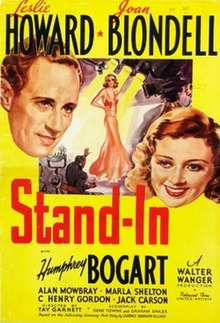Stand-In
| Stand-In | |
|---|---|
 Stand-In (1937, Movie Poster) | |
| Directed by | Tay Garnett Charles Kerr (assistant) |
| Written by | Clarence Budington Kelland (story) Gene Towne C. Graham Baker |
| Produced by | Walter Wanger (uncredited) |
| Starring | Leslie Howard Joan Blondell Humphrey Bogart |
Production company | |
| Distributed by | United Artists |
Release date |
|
Running time | 91 minutes |
| Country | United States |
| Language | English |
| Budget | $523,869[1] |
| Box office | $617,521[1] |
Stand-In is a 1937 American comedy film, directed by Tay Garnett and starring Leslie Howard, Joan Blondell and Humphrey Bogart. The picture was produced by the independent Walter Wanger, and released by United Artists. It is set in Hollywood and parodies many aspects of the film industry during the Classical Era.
Plot
The plot of Stand-In concerns the takeovers of Hollywood studios that occurred during the Great Depression. Fowler Pettypacker (Tully Marshall), a Wall Street banker, is debating whether or not to accept an offer from Ivor Nassau (C. Henry Gordon) to buy "Colossal Pictures," a fictional film studio on Poverty Row. The studio has not been turning a profit, but financial analyst Atterbury Dodd (Leslie Howard) advises against selling. He stakes his reputation on his mathematical calculations that show Colossal should turn a profit. The bank sends Dodd to Hollywood as the new head of the studio.
Colossal's star actress, Thelma Cheri (Marla Shelton), eccentric foreign director Koslofski (Alan Mowbray), and press agent Tom Potts (Jack Carson) are conspiring with Nassau to sabotage the studio. They are deliberately running up costs on producer Douglas Quintain's (Humphrey Bogart) jungle feature, Sex and Satan so that the film flops and the studio goes bankrupt.
In Hollywood, Dodd meets Lester Plum (Joan Blondell), a cheerful former child star currently working as a stand-in for Cheri. Lester teaches Dodd about the business of filmmaking and eventually becomes his secretary. Under Lester's tutelage, Dodd comes to see that the workers are more than just numbers. Lester falls in love with Dodd, but he is initially oblivious to her feelings.
When Dodd is unimpressed by a viewing of Sex and Satan, Koslofski puts the blame squarely on Quintain. Quintain had discovered Cheri and made her a star, falling in love with her in the process, but she sides with Koslofski. As a result, Dodd fires Quintain. After an audience preview confirms that the film is awful (they prefer the ape over Cheri's performance), Dodd seeks out the heartbroken producer. Once he sobers up from his drunken binge, Quintain comes up with the idea to salvage the film by cutting down Cheri's part and expanding the ape's. However, before they can do so, Pettypacker telephones Dodd, informing him that he has sold the studio to Nassau, and that Dodd is fired. Dodd convinces the initially hostile workers into rallying behind him to finish the film. Then, he asks Plum to marry him.
Cast
- Leslie Howard as Atterbury Dodd
- Joan Blondell as Lester Plum
- Humphrey Bogart as Doug Quintain
- Alan Mowbray as Koslofski
- Marla Shelton as Thelma Cheri
- C. Henry Gordon as Ivor Nassau
- Jack Carson as Tom Potts
- Tully Marshall as Fowler Pettypacker
- J. C. Nugent as Junior Pettypacker
- William V. Mong as Cyrus Pettypacker
Reception
The film recorded a profit of $9,274.[1]
